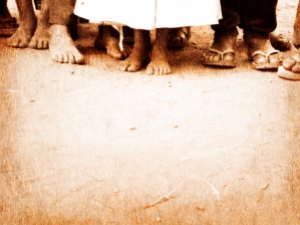Anticipating a few calls, talks and emails about my wife’s new book, Faithfully Frugal. I’m convinced it’s her best one yet, and yet it might cause a stir in your home. Maybe in your wallet.
Kari has the audacity to write about a taboo subject: money. Especially our relationship with money. It might cause some people to squirm. And … then … if they stick with it … to find happiness. Especially if a husband and wife team can get on the same page in their finances.
There are dozens of great resources out there on finding financial freedom and becoming savvy with your money. Take a course, buy an audiobook, create a budget, stick with it.
Yet, we see a gap between the “how to” of saving money and the “why” of being generous. Most courses and books seem to promise “more money for you,” as if keeping more of your money will ultimately make you happier. (And make God happier and proud of you.) Fear and pride go a long way to changing behavior, though they won’t producing lasting change, which must take root in the heart.
This isn’t a guilt trip. This isn’t a call to sell all you have and give all the proceeds to the poor (though Jesus told one guy to do just that). 1 You cannot save your soul by giving away all your stuff. At the same time, while you can’t buy happiness, I’m convinced you can give it away. That’s what Jesus did.
We intentionally went FREE with the releases of Plenty and Let in Light because we think the words carry weight. It seemed like both books were meant for the ladies (I guess Plenty clearly was, as the subtitle suggests: “31 Sips of Joy for Moms Everywhere.”) Even still, Faithfully Frugal, though foo-foo sounding, isn’t just for frugal moms everywhere.
Men, I implore you to read this book. At the very least, download it free today. (Works on Kindle AND any other computer or device.) If your wife brings up the subject, put on your work boots, pour a cup of black coffee, and listen to her. There’s something happening in the garden of her heart, and she wants a husband (literally, “gardener”) to tend it and help her grow.
I hope many men read this book.
In fact, it’s so short — though lacking pictures, sorry — you could read it in under a half hour. Great words packed into this tiny book. Like how they should “show DIY-manuals with pictures of people crying or punching holes in walls.” You might even laugh in that half hour. Yet the effect I hope it has on you will last far longer.
Maybe the retro cover is too feminine for you? 2
Men, if , try this man version…
Think of the Capital One vikings running across it plundering and hollering, “What’s in your wallet?”
Better yet, “What’s in your heart?”
(It’s an e-book, so there’s no cover to hide in real life.)
Faithfully Frugal isn’t about penny-pinching. Not trying to be “penny wise” yet “pound foolish.” I promise there are no tips in there on hoarding coupons, though you could make your own laundry detergent (maybe), and certainly eat at home for less. Plus, invite others over and make a hospitable night of it.
The subtitle gives away the three big ideas: Spend Less, Give More, Live More.
The point is: when we intentionally look at our money as actually being God’s resources, and we move ourselves from greed toward generosity, we will find more freedom and joy than you ever imagined. Happiness cannot be bought, though it can be given.
Jesus, The Man, gave all He had. Let’s do the same, men.
“For you know the grace of our Lord Jesus Christ, that though he was rich, yet for your sakes he became poor, so that you through his poverty might become rich.”
—2nd Corinthians 8:9 (NIV)
- I’m convinced if Jesus said those words to a woman she would have done it right away, all the way, and with a happy heart. And then asked what else she could do as she left all to follow the Master. In the real scene, the man walked away dejected. ↩
- (Thank you, Pepper, for creating the real retro cover.) ↩






 Churches shall be:
Churches shall be:
 Ever get frustrated at your lack of productivity, especially when “work” comes down to coming up with good ideas and implementing them? Feel like you’re constantly running out of time?
Ever get frustrated at your lack of productivity, especially when “work” comes down to coming up with good ideas and implementing them? Feel like you’re constantly running out of time?




 If we begin our days by staring at the one who never gave up, who was joyfully obedient to God His Father until the very end. And then follow in His steps.
If we begin our days by staring at the one who never gave up, who was joyfully obedient to God His Father until the very end. And then follow in His steps.